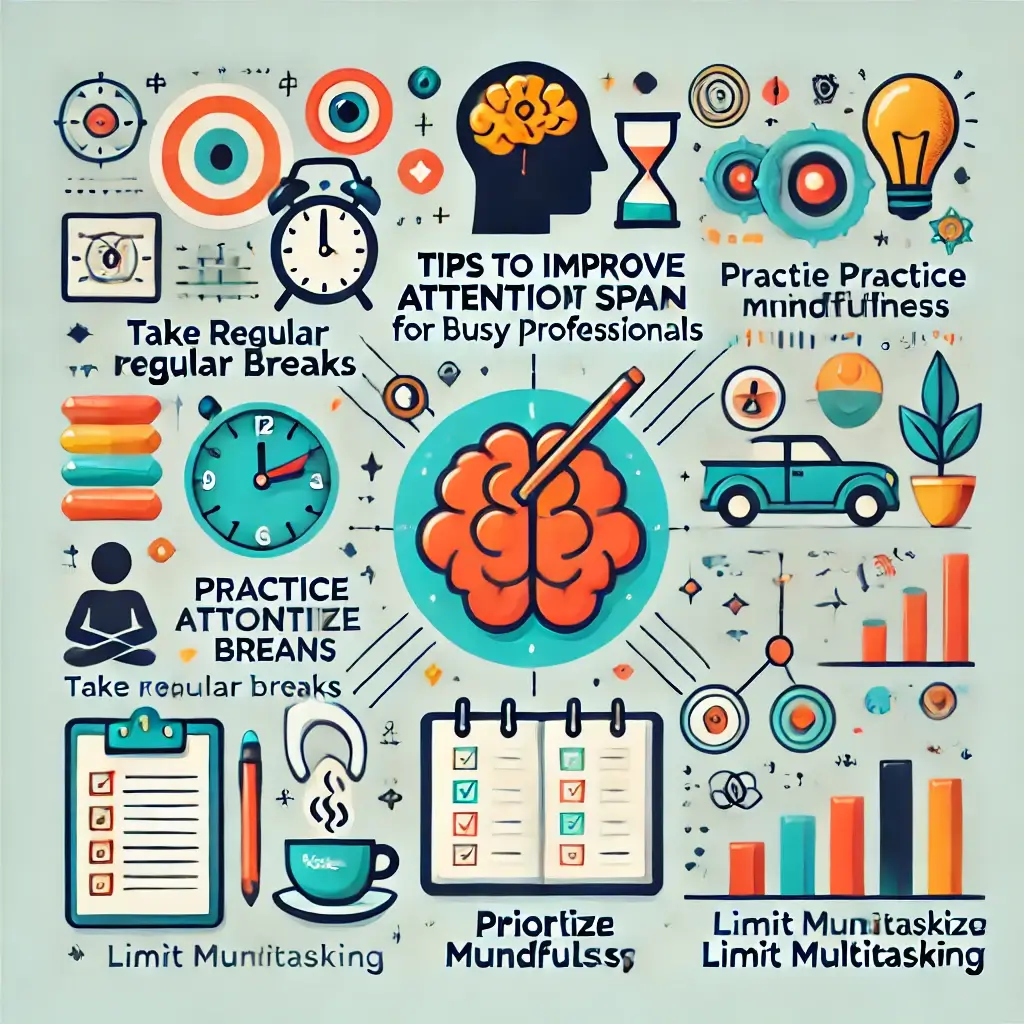In a fast-moving environment like today’s, most professionals are engaged in very many activities that lower their attention span and deprive them of brainpower. Ensuring the power of focus is a very key element in achieving much in any venture. This document provides several useful tips that can help a busy professional improve his or her attention span and increase his or her brainpower.

Table of Contents
Attention Span and Brain Power
Attention span is described as the amount of time a person can concentrate on doing something without his mind drifting away. In simple terms, attention span refers to the duration within which a person can maintain concentration on one thing without letting any kind of distraction creep in.
Productivity is highly dependent on attention span, as that is what determines the quality and rate of work output. On the other hand, brainpower relates to all higher cognitive functions, including memory, reasoning, problem-solving, and creativity. Better brainpower signifies better powers of focus and better overall performance.

Improving Attention Span and Brain Power: Some Importance
Attention span and high brain power are characteristics that guarantee support, which the busy professional is in most need of. A better focus infuses more productivity, superior decision-making, and lower stress levels. Higher brain power means that professionals can process information more effectively, think more creatively, and perform tasks with greater efficiency.
Tips to Improve Attention Span and Boost Brain Power
1. Prioritize Sleep and Rest

Attention and memory are not possible without adequate sleep. Lack of sleep negatively impacts attention, memory, and decision-making. If you would like to be capable of paying better attention and having greater brainpower, then you should acquire 7-9 hours of quality sleep each night.
Establish a normal pattern of sleep, create an environment that allows you to rest well, and avoid caffeine and all devices with screens before sleeping.
It helps in cleaning the brain from toxins that are accumulated in the brain during the day and consolidates memories. Poor sleep increases stress levels that interfere with attention and concentration. One should practice sleep hygiene for efficient functioning of the brain and better development of an attention span.
This is actually a very important concept; that it is strong through which one can gain focus and empower the brain. Through these practices, one can reduce stress levels while acquiring heightened awareness and mental clarity. Start your mindfulness meditation for a few minutes a day and gradually increase the duration. Bring your attention to your breath, noting how your thoughts go on without any judgment and bring back your attention when it wanders.
Mindfulness exercises are as simple as maintaining your focus on your breathing, noticing when the mind wanders, and then gently bringing it back to the present moment. In time, such practice will condition your brain and enable you to have greater control over focus and emotions. Developing your concentration and stress skills will occur naturally as you implement the mindfulness component into your daily activities.
2. Breaking Tasks into Manageable Chunks
Big tasks will be overwhelming, and one will tend to procrastinate. Break them down into small, easily manageable tasks that will keep you on the move without losing interest in doing it. The Pomodoro Technique is another good strategy: just work for 25 minutes, then take a 5-minute break. Good time management in that manner is avoiding burnout.
By chopping down tasks into smaller bits, you will feel accomplished every time you finish one of them. Moreover, this will also enable one to take regular breaks to refresh the mind and reboot for improved productivity. Chunking tasks into pieces makes even the most daunting projects look manageable and helps to stay focused during the day.
3. Stay Organized
A cluttered workspace is a potential distraction that may make one lose focus. Keep your work environment neat and organized. Tools to keep one in check in managing tasks like to-do lists, calendars, or project management applications. Prioritize those that have imminent deadlines and tackle them one at a time; avoid multitasking.
Tools at the organizational level will assist you in laying the day’s plan, realistic goal setting, and marking your progress. Organize your workspace—this will clear your working environment and your mind of clutter. Focus on effective organization to increase attention and productivity.
4. Physical Exercise Should be Practiced Daily
Exercise supports an augmented blood flow to the brain and releases various neurochemicals, which balance steady brain power. Engage in physical activity at least at a moderate level for a minimum of 30 minutes most days of the week. This may include brisk walking, jogging, cycling, yoga, strength training, or other activities that enhance blood circulation to the brain, improving concentration and clarity of mind.
Exercise, on the other hand, is a great friend of the brain. It rewards one with the growth of new neurons and improvements in the interconnections in different areas. Exercise decreases the levels of stress and anxiety, thus allowing better focusing on any activity. It has a very strong impact on your physical and mental health if you incorporate it into your daily routine.
5. Eat a Brain-Healthy Diet
Nutrition and brain health go hand in hand. A well-balanced diet rich in antioxidants, good fats, vitamins, and minerals supports optimal brain function. Eat more green leafy vegetables, cold water fatty fish, berries, nuts, and seeds. Drink lots of water during the day.
Omega-3 fatty acids, antioxidants, and B vitamins have the beneficial effects on the brain. These nutrients improve memory, protect against cognitive decline, and support overall brain functioning. A diet good for the brain offers the essential building blocks necessary for the best cognitive performance and attention.
6. Take breaks regularly.
This lets the mind rest for a bit, recharge, and refocus. This will keep your brain refreshed and improve your attention span. Take short leaves from work, and move out of your desk. Stretch yourself, take a walk, or do something that will let you rest your minds.
Scheduled breaks will prevent you from experiencing burnout and help in keeping up your energy all day long. Exposing your mind to some cooling activity during such breaks may rejuvenate it and sharpen your concentration when you get back to work. And so, it is easy to make regular breaks an easy way to maintain focused attention.
7. Limit Distractions
Identify, and eliminate/minimize areas of distraction in your work environment. It will turn off notifications on your phone and laptop, slip into noise-cancelling headphones, or maybe even restrict the times you check emails and social media. Set up a workspace where you can sit down to focus without being disturbed on any single task at hand.
These are normally highly distracting and can make it difficult for you to focus and work effectively on any task. A work environment free from distractions will enhance your ability to focus more and increase your effectiveness in work. This simply means creating boundaries around the use of technology and other potential things that can cause distraction.
8. Engage in Deep Work
Deep work requires one to work on cognitively demanding tasks without distraction. One can often practice attention to increase the capacity of attention as well as the depth of brain power by training the mind to focus on one thing for a long time. Scheduling deep work times as blocks of time and guarding this time from invasion is important.
Deep work is basically a work or activity done in a state of distraction-free maximum concentration and/or creative effort. You can get much higher levels of productivity and often create much better work if you set aside specific times for deep work. With deep work habits well-developed, you will be able to upgrade your overall cognitive capabilities and attention span greatly.
9. Train Your Brain
Keep your brain active with new and challenging activities. This can help improve cognitive functioning. Try working on puzzles, reading, learning a new language, or playing a musical instrument. These things increase memory, problem-solving, and attention.
Brain-train exercises can be of great help in keeping the mind sharp and having an overall better view about one’s cognitive functioning. Getting mentally stimulating activities as a habit helps in building neuroplasticity—the brain adapts and grows. This may help long-lasting cognitive health and concentration. How should it be taken? Include the following suggested brain-training activities in your daily routine.
10. Manage Stress

Long-term stress can negatively affect one’s attention span and brain power. Manage your stress with deep breathing, yoga, and mindfulness. Make time for hobbies and activities that bring joy and relaxation. Seek support from friends, family, or a mental health professional when necessary.
Stress is capable of reducing cognitive functioning and can diminish focus. In other words, by keeping stress in check, you can really save your brain from the damage that stress does and remain focused. Of course, developing an effective stress management plan that includes relaxation techniques and self-care activities is also paramount to superior brain health.
11. Be Curious and Keep Learning
It works actively with the brain and is good for cognitive functioning. Always stay curious, open to new experiences. Go to workshops, take online learning programs, read books, and explore the subjects that might be of interest to keep your brain busy. Keeping the brain active and engaged can enhance attention span and bolster overall brain power.
Lifelong learning challenges the brain continually and increases the growth of new links between brain cells. Acquiring more knowledge with new skills will increasingly enhance one’s developing cognitive abilities and help one maintain a level of smartness. One great way of engendering these mental abilities with strong attention spans is by embracing lifelong learning.
Attention span is important in the improvement of brainpower for professionals who are too busy to do so. This can be achieved by first ensuring one gets enough sleep, applying mindfulness, keeping oneself organized, exercising, and eating a diet that will promote the health of the brain. By applying these suggestions into daily life routines, professionals can begin performing at higher levels while experiencing less stress in their professional lives.
Further ways to increase your attention span and brainpower are deeper work, more regular breaks, less opportunity for distractions, brain-training games, and more mitigation of stress and curiosity. If you can follow these ways, then you will definitely bring the best out of you in your professional life.
It is the high time to start practicing these strategies, as they are more likely to improve your attention span and increase your brain power. If you practice the steps with commitment and resilience, you will be focused, highly productive, and successful in your endeavors, either at a professional or personal level.

